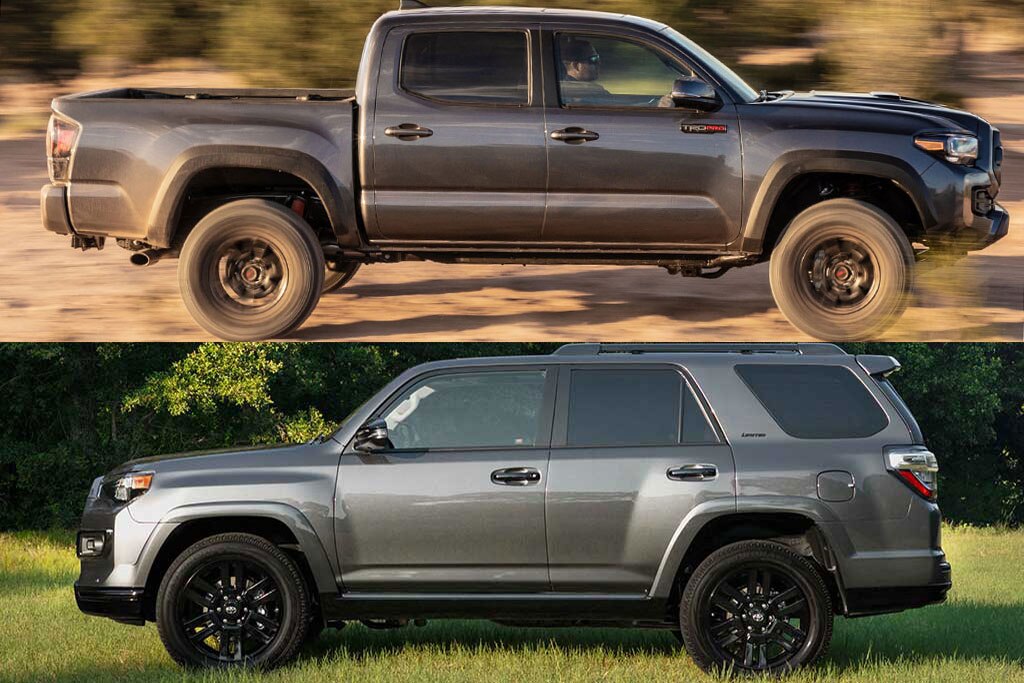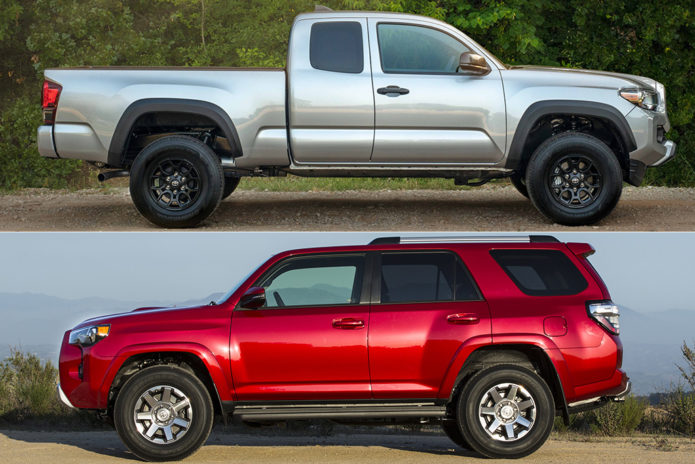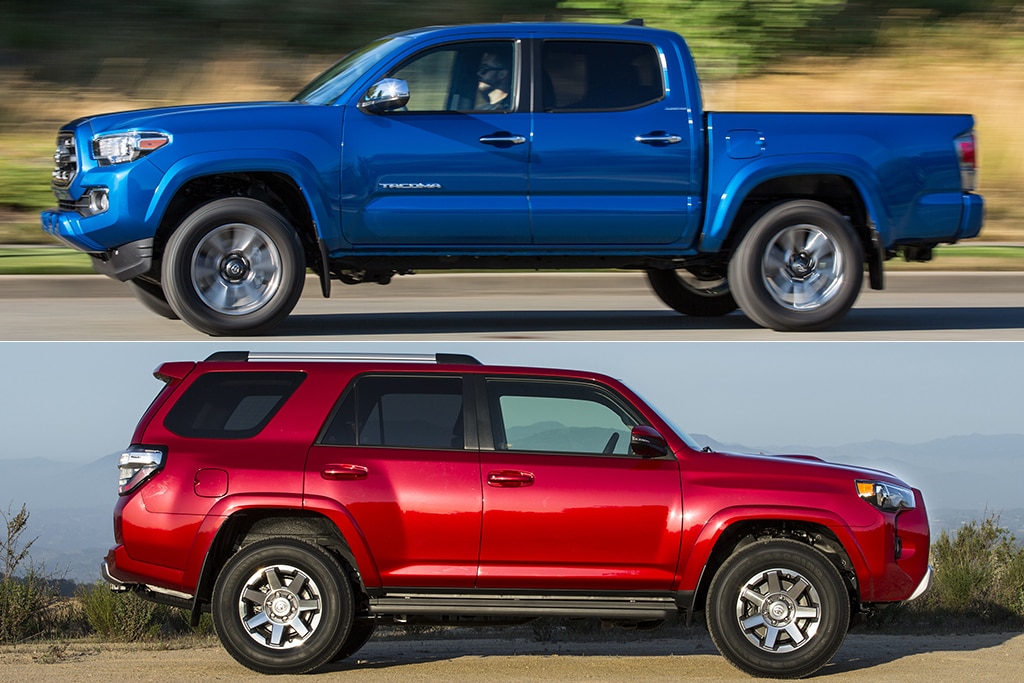tacoma vs 4runner reliability
Related Articles: tacoma vs 4runner reliability
Introduction
With great pleasure, we will explore the intriguing topic related to tacoma vs 4runner reliability. Let’s weave interesting information and offer fresh perspectives to the readers.
Table of Content
Navigating the Terrain of Reliability: Tacoma vs. 4Runner

The Toyota Tacoma and 4Runner are two titans of the off-road and truck market, renowned for their durability and dependability. Both vehicles boast a loyal following, each appealing to different needs and preferences. However, when it comes to reliability, a closer examination reveals nuances that can help potential buyers make informed decisions.
A Tale of Two Toyotas: Understanding the Differences
The Tacoma, a compact pickup truck, prioritizes maneuverability and fuel efficiency. It thrives in urban environments while maintaining off-road capability. The 4Runner, a mid-size SUV, emphasizes spaciousness and comfort, offering a more luxurious experience with robust off-road prowess.
Delving into the Data: Reliability Ratings
To understand the reliability of these vehicles, it’s crucial to look beyond subjective opinions and delve into objective data. Organizations like J.D. Power, Consumer Reports, and Vehicle History provide valuable insights.
- J.D. Power consistently ranks both the Tacoma and 4Runner high in their Vehicle Dependability Study (VDS), reflecting their low frequency of problems experienced by owners.
- Consumer Reports also awards both models strong reliability scores, indicating their ability to withstand the test of time and perform consistently.
- Vehicle History provides detailed reports based on actual owner experiences, offering a comprehensive view of potential issues and their frequency.
Unraveling the Factors Influencing Reliability
While both vehicles share Toyota’s reputation for robust engineering, several factors influence their reliability:
- Engine and Transmission: Both the Tacoma and 4Runner have a history of reliable powertrains. The Tacoma’s 2.7L and 3.5L V6 engines, paired with a 6-speed manual or automatic transmission, have proven their durability. The 4Runner’s 4.0L V6 engine, coupled with a 5-speed automatic transmission, also boasts a strong track record.
- Suspension and Drivetrain: The Tacoma’s solid rear axle and the 4Runner’s independent rear suspension offer different handling characteristics. The Tacoma’s setup is more rugged, while the 4Runner’s provides a smoother ride. Both systems are known for their resilience and longevity.
- Body and Frame: Both vehicles utilize robust construction techniques and materials, ensuring longevity and resistance to corrosion.
- Electrical Systems: Toyota vehicles are generally known for their reliable electrical systems. However, as with any vehicle, aging components can lead to issues, requiring careful maintenance and attention.
Navigating the Nuances: Exploring Specific Concerns
While both the Tacoma and 4Runner exhibit high reliability, some specific concerns may arise:
- Tacoma: Some owners have reported issues with the rear differential, particularly in older models. Additionally, the tailgate’s latch mechanism can be prone to failure.
- 4Runner: Older models may experience problems with the timing chain, requiring replacement. Additionally, the 4Runner’s complex suspension system can be prone to wear and tear over time.
Addressing Concerns: The Role of Maintenance
Regular maintenance is paramount in preserving the reliability of any vehicle. By adhering to the manufacturer’s recommended service schedule, owners can mitigate potential issues and extend their vehicle’s lifespan.
- Oil Changes: Regular oil changes are essential for engine health. Using high-quality oil and adhering to the recommended intervals can significantly impact engine longevity.
- Fluid Checks: Maintaining proper fluid levels in the transmission, differential, and power steering system is crucial.
- Tire Rotation and Alignment: Regular tire rotation and wheel alignment ensure even wear and prevent premature tire damage.
- Brake Inspection and Maintenance: Inspecting and maintaining the brake system is critical for safety and ensures optimal performance.
FAQs: Addressing Common Queries
Q: Which vehicle is more reliable, the Tacoma or the 4Runner?
A: Both vehicles are highly reliable, with the Tacoma often edging out the 4Runner in reliability rankings. However, both models have a strong track record of dependability.
Q: What are the common problems associated with the Tacoma and 4Runner?
A: The Tacoma has been known for issues with the rear differential and tailgate latch mechanism. The 4Runner has experienced problems with the timing chain and suspension components.
Q: How often should I service my Tacoma or 4Runner?
A: Refer to the manufacturer’s recommended service schedule for specific maintenance intervals. Generally, oil changes are recommended every 5,000-7,500 miles.
Q: What are some tips for maintaining the reliability of my Tacoma or 4Runner?
A: Regular maintenance, including oil changes, fluid checks, tire rotation, and brake inspection, is essential. Additionally, using high-quality parts and adhering to the manufacturer’s recommendations can help preserve reliability.
Conclusion: Choosing the Right Path
Ultimately, the choice between the Tacoma and 4Runner depends on individual needs and preferences. Both vehicles offer exceptional reliability and durability, making them excellent choices for those seeking a dependable and capable vehicle. By understanding the nuances of each model and prioritizing regular maintenance, owners can maximize their vehicles’ lifespan and enjoy a rewarding ownership experience.








Closure
Thus, we hope this article has provided valuable insights into tacoma vs 4runner reliability. We hope you find this article informative and beneficial. See you in our next article!